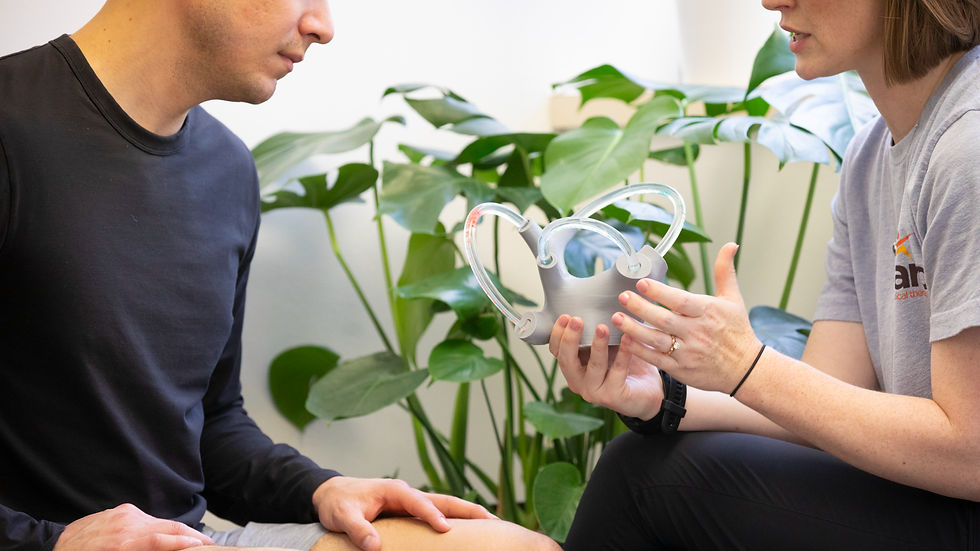Post-Concussion Dizziness: Why You Still Feel “Off” Weeks Later
- Kelsy Rayl

- Jul 30, 2025
- 3 min read
Updated: Sep 10, 2025
So your concussion was weeks ago—maybe even months—but something still isn’t right. You’ve been cleared for activity, the headaches might be better, and everyone keeps saying you “look fine.”
But inside? You still feel off.
Maybe you’re dizzy. Maybe grocery stores feel overwhelming. Maybe your balance is shaky. Maybe your body just doesn’t feel like your own.
If that sounds familiar, you’re not alone—and more importantly, there’s a reason.
Why Am I Still Dizzy Weeks After a Concussion?
While most people recover from a concussion within a few weeks, up to 30% experience lingering symptoms1 well beyond that window. One of the most common and most frustrating? Dizziness.
Post-concussion dizziness can stem from a number of sources, but three major players tend to show up again and again:
Vestibular dysfunction
Visual system disruption
Neck (cervicogenic) involvement
Let’s break those down.

1. Vestibular Dysfunction: Your Inner Balance System (Your Inner GPS)
The vestibular system is your body’s internal balance center, made up of tiny structures in your inner ear and their connections to your brain. After a concussion, this system can be disrupted—leading to symptoms like:
Feeling off-balance or unsteady
Motion sensitivity (cars, crowds, screens)
Vertigo or “spinning” sensations
Brain fog and fatigue after movement
Vestibular dysfunction doesn’t always show up right away, and it often doesn’t resolve on its own without targeted therapy.
2. Visual Disturbance: When Your Eyes and Brain Don’t Agree
We don’t just see with our eyes—we interpret, track, and coordinate movement. After a concussion, your brain’s ability to process visual information can be affected, causing:
Blurry or double vision
Trouble focusing while reading or scrolling
Eye strain or headaches
Difficulty with depth perception
This creates a mismatch between what your eyes and body are telling your brain—fueling that dizzy, disoriented feeling.
3. Neck-Related Dizziness (Cervicogenic Dizziness)
Your neck plays a huge role in spatial awareness. If you suffered whiplash, a fall, or a blow to the head, your cervical spine and surrounding muscles might still be irritated—sending confusing signals to your brain about where your head is in space.
This is called cervicogenic dizziness, and it can linger long after other symptoms resolve. Often, it overlaps with vestibular and visual issues, creating a triple-whammy effect that leaves you feeling stuck.

So… What Can You Do About It?
You don’t have to “wait it out” or push through lingering symptoms. At Sparq Physical Therapy in Castle Rock, we specialize in vestibular and concussion rehabilitation, designed to get to the root of your symptoms and help your brain recalibrate.
At SparqPT, our concussion rehab process includes:
A deep dive into your vestibular and visual systems
Assessment of neck function and movement
Individualized exercises to retrain your brain
Progress tracking so we can adjust as you improve
We understand that lingering symptoms can feel invisible to others, but we see you. And we’re here to help you feel like yourself again.
When Should You Reach Out for Post-Concussion Dizziness?
If you’re still experiencing dizziness, imbalance, or mental fatigue after a concussion—especially if it's been more than 10–14 days—it’s worth getting evaluated. The earlier we start, the faster you can get back to clear-headed, confident movement.
If it’s been more than 10–14 days since your concussion and you’re still experiencing:
Difficulty concentrating or visual fatigue
Motion sensitivity in busy environments
…it’s time to seek help. Early intervention leads to faster, more complete recovery.
Ready to Feel Like Yourself Again?

Recovery after a concussion isn’t always straightforward—especially when symptoms like dizziness linger longer than expected. But persistent symptoms don’t mean you’re making it up, and they don’t mean you’re stuck this way forever.
At SparqPT, we take a comprehensive, personalized approach to concussion rehabilitation. If you’re still feeling “off,” we’re here to help uncover the why—and guide you through the how of getting better.
If you’re in the Castle Rock area and ready for answers, let’s talk. Schedule a neuro evaluation today and take the first step toward feeling steady, clear, and confident again.





Comments